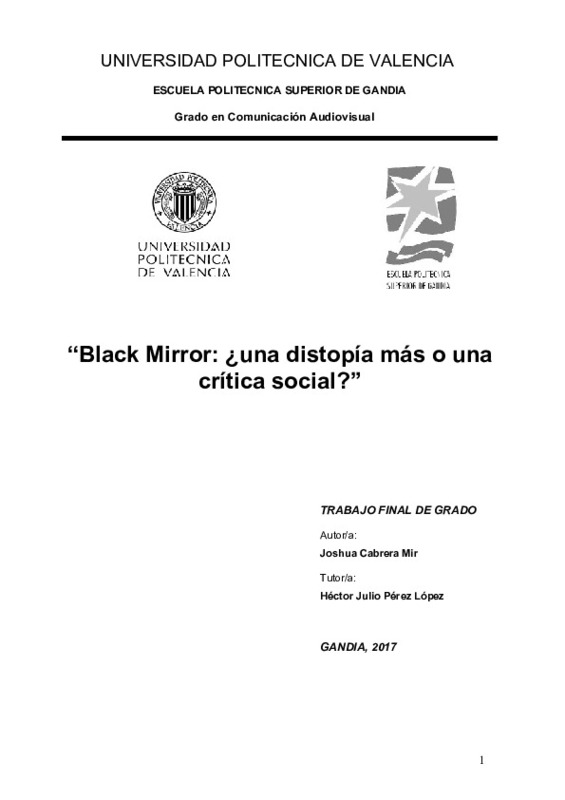JavaScript is disabled for your browser. Some features of this site may not work without it.
Buscar en RiuNet
Listar
Mi cuenta
Estadísticas
Ayuda RiuNet
Admin. UPV
Black Mirror: ¿Una distopía más o una crítica social?
Mostrar el registro sencillo del ítem
Ficheros en el ítem
| dc.contributor.advisor | Pérez López, Héctor Julio
|
es_ES |
| dc.contributor.author | Cabrera Mir, Joshua
|
es_ES |
| dc.date.accessioned | 2017-07-26T12:21:54Z | |
| dc.date.available | 2017-07-26T12:21:54Z | |
| dc.date.created | 2017-07-20 | |
| dc.date.issued | 2017-07-26 | es_ES |
| dc.identifier.uri | http://hdl.handle.net/10251/85796 | |
| dc.description.abstract | Black Mirror ha sido objeto en muchas ocasiones de teorías acerca del contenido crítico que se dice que posee, pero ¿cómo se llega a esa conclusión? ¿Qué aspectos de la serie conducen a pensarlo, y por qué? ¿Son los diálogos, el ambiente que se respira, el perfil de los personajes, o un poco de todo? Este trabajo quiere sumarse a las investigaciones sobre la serie. Mediante la observación, la reflexión y la comparación, se presenta un trabajo, apoyado con imágenes, que conecta la serie con las características más representativas y convencionales de algunos conceptos como pueden ser la crítica social, la distopía o el ciberpunk (el subgénero de ciencia ficción conocido por centrarse en la creación de futuros muy avanzados en tecnología y prácticamente deshumanizados). Se considera que Black Mirror permite “múltiples etiquetas de clasificación”. Este trabajo pretende demostrarlo identificando elementos, pero, en última instancia, lo más importante es seguir disfrutando de la serie | es_ES |
| dc.description.abstract | Black Mirror has often been the subject of theories about the critical content that is said to possess, but how do it’s come to that conclusion? What aspects of the series lead to think about it, and why? Are the dialogues, the atmosphere that is breathed, the profile of the characters, or a little of everything? This work wants to join the research on the series. Through observation, reflection and comparison, there is a work, supported by images, that connects the series with the most representative and conventional features of some concepts such as social criticism, dystopia or cyberpunk (the subgenre of science fiction known to focus on creation of advanced futures in technology and practically dehumanized). Black Mirror is considered to allow "multiple sorting labels". This work tries to prove it by identifying elements, but, ultimately, the most important thing is to keep enjoying the series. | es_ES |
| dc.format.extent | 50 | es_ES |
| dc.language | Español | es_ES |
| dc.publisher | Universitat Politècnica de València | es_ES |
| dc.rights | Reserva de todos los derechos | es_ES |
| dc.subject | Dystopia | es_ES |
| dc.subject | technology | es_ES |
| dc.subject | cyberpunk | es_ES |
| dc.subject | Distopía | es_ES |
| dc.subject | tecnología | es_ES |
| dc.subject | Black Mirror | es_ES |
| dc.subject | Crítica social | es_ES |
| dc.subject.classification | COMUNICACION AUDIOVISUAL Y PUBLICIDAD | es_ES |
| dc.subject.other | Grado en Comunicación Audiovisual-Grau en Comunicació Audiovisual | es_ES |
| dc.title | Black Mirror: ¿Una distopía más o una crítica social? | es_ES |
| dc.type | Proyecto/Trabajo fin de carrera/grado | es_ES |
| dc.rights.accessRights | Abierto | es_ES |
| dc.contributor.affiliation | Universitat Politècnica de València. Escuela Politécnica Superior de Gandia - Escola Politècnica Superior de Gandia | es_ES |
| dc.contributor.affiliation | Universitat Politècnica de València. Departamento de Comunicación Audiovisual, Documentación e Historia del Arte - Departament de Comunicació Audiovisual, Documentació i Història de l'Art | es_ES |
| dc.description.bibliographicCitation | Cabrera Mir, J. (2017). Black Mirror: ¿Una distopía más o una crítica social?. Universitat Politècnica de València. http://hdl.handle.net/10251/85796 | es_ES |
| dc.description.accrualMethod | TFGM | es_ES |
| dc.relation.pasarela | TFGM\64755 | es_ES |
Este ítem aparece en la(s) siguiente(s) colección(ones)
-
EPSG - Trabajos académicos [5004]
Escuela Politécnica Superior de Gandia






